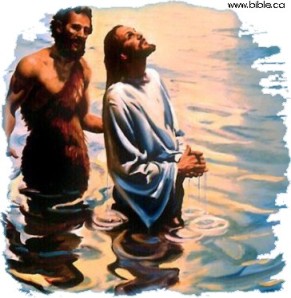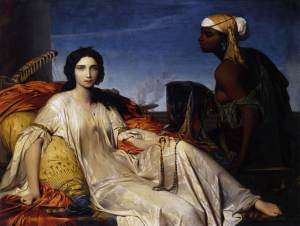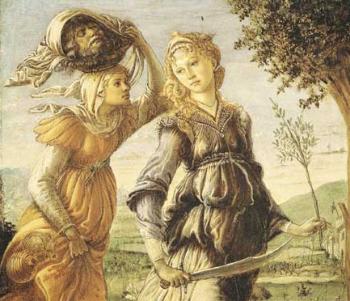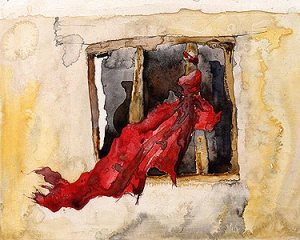Chapter 1, Baptism
 When most of us think of baptism, we have happy memories of babies (typically our children or grand children) receiving their initiation into the Christian faith. We remember family and friends close by, great joy that we have welcomed a precious new life into our faith. But Pope Benedict’s first chapter, and our first class, calls us to look deeper into the true meaning of Christian Baptism as defined by Christ’s experience at the Jordan River.
When most of us think of baptism, we have happy memories of babies (typically our children or grand children) receiving their initiation into the Christian faith. We remember family and friends close by, great joy that we have welcomed a precious new life into our faith. But Pope Benedict’s first chapter, and our first class, calls us to look deeper into the true meaning of Christian Baptism as defined by Christ’s experience at the Jordan River.
In the first four or five pages of Chapter 1, Pope Benedict sets the context for us, showing how John the Baptist fulfilled the words of the Old Testament prophets who foretold of one who would cry out in the wilderness, calling God’s children to repent, to make straight a highway in the desert. Benedict describes for us how Israel hadn’t seen a prophet for hundreds of years, and how John’s words and baptism by water were drawing people to examine their conscience.
But Benedict asks us to see the greater meaning of this scene. He points out that “Jesus’ Baptism anticipated his death on the Cross,” and was “an acceptance” of his future death “for the sins of humanity.” Baptism, he vigorously asserts, is a symbol of both death and life. You cannot delink them.
Benedict’s view is far from new. St. Paul drew a similar connection to baptism in his letter to the Romans, at 6:4: “We were indeed buried with him through baptism into death, so that, just as Christ was raised from the dead by the glory of the Father, we too might live in newness of life.”
Most of us were baptized when we were babies. We knew nothing about what our parents had chosen for us. Even when we were confirmed, how many of us chose that path? More than likely, it was the thing to do, the obligation we had to our parents to complete our journey as young Catholic adults.
But today, when we choose to renew our vows every Easter, we should think about what Pope Benedict is telling us here.
“To accept the invitation to be baptized now means to go to the place of Jesus’ Baptism. It is to go where he identifies himself with us and to receive there our identification with him.”
That means that we have to tangibly see and feel Jesus’ death for humanity, as well as his annointing at that moment as the “beloved son.” We need to ask ourselves: Are we truly engaged in repentance, in “turning away from” the old us, the one wedded to the material world and all it’s trapping? Or do we form a covenant with God through Christ to be something new, to live an intimate connection to the life Christ lived, and have his life live through us?
I have often been asked by my evangelical friends “Where are you in your walk with Jesus?” I never understood that question until I read Pope Benedict’s book. Chapter 1 launched me on my way, understanding that if we truly do commit to an intimate connection with Christ, we will find ourselves in a relationship unlike any other we can experience. Indeed, Benedict wraps up the chapter by quoting St. Augustine from his classic memoir, Confessions,
Jesus “can also become a contemporary of us all, ‘more interior” to each one of us “than we are to ourselves.’ “
Psalms 2, Shalom
 Craghan starts this lesson by speaking a little about the nature of the word Shalom, peace. Most of us know this word as the Hebrew greeting, equivalent to hello or goodbye. But Shalom has a much deeper meaning, as Craghan instructs us on page 90. Shalom…
Craghan starts this lesson by speaking a little about the nature of the word Shalom, peace. Most of us know this word as the Hebrew greeting, equivalent to hello or goodbye. But Shalom has a much deeper meaning, as Craghan instructs us on page 90. Shalom…
“is the fullest union of heaven and earth, the Lord and humans.”
As seen in the book of Numbers, God instructed Moses himself about how Aaron and the priests would bless the Israelites.
The LORD bless you and keep you! The LORD let his face shine upon you, and be gracious to you! The LORD look upon you kindly and give you peace!
St. Paul frequently opens his letters with the greeting, “Grace and peace to you.”
These blessings seek a place where worries are few, where there is a natural equilibrium in a person’s life, a placid state.
How do we achieve this peace? Is it by winning the lottery? Do we find peace through money, titles, defeating our enemies? I think that on the surface, the psalms of this lesson could falsely lead us to believe that the wealth and power of a handsome king are the foundations of peace. But the psalmist, I believe, wants us to go much deeper to the essence of shalom, to understand that peace comes from living your life in a way that fulfills God’s hopes and dreams for you.
In the prayer for the King in the Time of War, God’s help comes from the temple, a holy place — not a praetorium, or a forum, or some similar place of authority. It comes from the place where holiness reigns. Whatever the king endeavored, God’s intervention came because the royal entity sacrificed to and for God.
I think this is why Craghan ends the lesson talking about one of the least peaceful moments in Jesus’ life; the arrest of John the Baptist. Jesus knows that the peace of the world will only be achieved if he shuns a future of worldly royal glory, and sacrifices his very life, the very purpose God gave him life for.
So if we want to find shalom, we too must be willing to seek God’s plan for us and sacrifice for Him.
Psalms 2, Royal Priests are We
“But you are A CHOSEN RACE, A royal PRIESTHOOD, A HOLY NATION, A PEOPLE FOR God’s OWN POSSESSION, so that you may proclaim the Excellencies of Him who has called you out of darkness into His marvelous light” 1 Peter 2:9
These are the words of the Rock the Catholic Church was built on. This is a seldom thought of dictate for followers of Christ, sort of like an 11th Commandment for believers. As we enter into our six-week Psalms II study and Lent, we fittingly begin with two lessons on the Royal Psalms. These Psalms originally were written as part of celebrations of the king (David?), but if the Psalms are eternal prayers that speak to us as well, they call to us with great present-day relevance three thousand years later.
Craghan begins this lesson describing the influence of power and how humans are so susceptible to abusing it. King David and his contemporaries were no less human, and so the Psalmist writes about the virtues of ideal kingship.
The author of Psalm 132 links us to David’s entry into ancient Jerusalem after long and difficult battles with Israel’s enemies (2 Samuel 7). David was grateful for victory and safety. But he also was anxious for the fact that the Ark of the Covenant, that holy resting place Moses and the Exodus Jews built for God, had no permanent home.
the king said to Nathan the prophet, “Here I am living in a house of cedar, but the ark of God dwells in a tent!” 2 Sam 7:2
David made a point, despite his weariness, and no doubt the many other obligations he had as king of Israel, to place God’s welfare first. As Christians, we often forget the first commandment: “YOU SHALL LOVE THE LORD YOUR GOD WITH ALL YOUR HEART, AND WITH ALL YOUR SOUL, AND WITH ALL YOUR MIND”
Everything we are and do comes from placing God first in our lives. So we should take heed when we read the Psalmist’s words for David:
“I will give my eyes no sleep, my eyelids no rest, Till I find a place for the LORD, a dwelling for the Mighty One of Jacob.” Psa 132:4
Making certain that there is a dwelling for the Lord in our hearts and lives is the basis for a righteous existence, to fulfill the duties of “a royal priesthood.”
Psalm 110 (found on page 84 of Craghan and part of this past week’s lesson), once was the subject of a catechesis by the former Pope Benedict. A remarkable theologian, Benedict reminds us how Jesus used Psalm 110 to challenge the Pharisees after they had questioned him repeatedly, trying to entrap him so they could condemn him.
The Question about David’s Son. (Matt: 22:41-46)
While the Pharisees were gathered together, Jesus questioned them,saying, “What is your opinion about the Messiah? Whose son is he?” They replied, “David’s.”He said to them, “How, then, does David, inspired by the Spirit, call him ‘lord,’ saying:
‘The Lord said to my lord, “Sit at my right hand until I place your enemies under your feet”’?
If David calls him ‘lord,’ how can he be his son?”No one was able to answer him a word, nor from that day on did anyone dare to ask him any more questions.
Benedict teaches: “The paschal event of Christ thus becomes the reality to which the Psalm invites us to look, to look at Christ to understand the meaning of true kingship, to live in service and in the gift of self, in a journey of obedience and love “to the end” (cf. Jn 13:1 and 19:30).
In praying with this Psalm let us therefore ask the Lord to enable us to proceed on his paths, in the following of Christ, the Messiah King, ready to climb with him the mount of the cross to attain glory with him, and to contemplate him seated at the right hand of the Father, a victorious king and a merciful priest who gives forgiveness and salvation to all men and women.”
Lent is a perfect time to reflect on the Royal Psalms and what they require from us as Royal Priests. For example, Psalm 101 describes the perfect King, the royal priest, saying he/she is a person who follows “the way of integrity” and shuns things like slander, shame, deviousness.
Every Sunday we are reminded during the Eucharistic Prayer that our royal priesthood has been passed down to us by Christ through his “cross and resurrection.” We are, as the celebrant reads at mass, “a chosen race, a royal priesthood, a holy nation, a people set apart.”
As we attend mass this Lenten season, pay closer attention to the Eucharistic Prayer and think about your calling as a royal priest of Christ.
St. Pat’s Book Club, Esther and destiny

I love this depiction by Francois-Leon Benouville. Esther seems troubled by something. Perhaps the challenge to fulfill her destiny?
As we close out our first book club series, we come to the phenomenal story of Esther. As Irene Nowell tells us, there were two versions written, the shorter Hebrew version that doesn’t seem to acknowledge God’s presence, and a later Greek version that injected the presence of God.
Why do you think the original version didn’t include God?
What was the author thinking?
What would be the purpose for excluding God?
When I studied Esther in my fourth year of bible study with the Archdiocese, we didn’t spend enough time on this issue, and I was a little disappointed about that. It troubled me that someone would be inspired to write this story explaining the celebration of the holiday of Purim, and not choose to include the source of the inspiration. To quote a contemporary phrase, “What’s that all about?”
For me, the answer can be found in one of the key turning points in the story, when Esther’s uncle Mordecai pleads for her to petition King Ahasuerus to overturn his decree that will wipe out the Jewish people. Initially, Esther throws up an excuse that expresses her fear that the king will punish her with death for disobedience, like he did with her predecessor, Queen Vashti.
But then, Mordecai challenges his niece to ponder whether or not her life had always been leading up to this very moment.
When Esther’s words were reported to Mordecai, he had this reply brought to her: “Do not imagine that you are safe in the king’s palace, you alone of all the Jews. Even if you now remain silent, relief and deliverance will come to the Jews from another source;but you and your father’s house will perish. Who knows—perhaps it was for a time like this that you became queen?” (Judith 4:13-14)
Esther is a very lucky woman having won that extravagant contest to replace Queen Vashti. Was her success only so that she could live a lush life in the harem of King Ahasuerus? As Mordecai points out, Esther’s Jewishness may not remain hidden from the King (if it isn’t already known), and as such she might find herself to be the predecessor all the pretty virgins speak about at the next beauty contest.
Esther girds up her courage and decides to take action. She first strips off her pretty garments and other adornments (notice the contrast to how women of the Old Testament used clothing, perfume and other accessories to attract and distract others) and prays fervently to her Lord for courage and strength and guidance.
The rest, as they say, is history. The decree is overturned and Haman, once the powerful and trusted second in command, is defeated. Even his sons lives are taken in order to reduce the possibility of revenge. Esther has taken up God’s challenge for her role in history, and met it.
What do you think about your life and what God calls you to be and to do? Do you ever spend much time thinking what it is God wants from you? Irene Nowell poses that perhaps Esther came into a fuller appreciation of herself and her faith through this hardship. Esther places God rightly at the center of her being, and the meaning of her existence. As we know from the first Commandment handed down by Moses, we are called to love God first and base our actions and words around his desires for us.
So perhaps the original Hebrew author left out God because he had an immature faith. Or maybe he left God out so his readers would be drawn to the question “Where is God?” If the latter, I applaud the author for offering such a brazen challenge. I also applaud Esther for her humanity, her initial lack of courage, her growing into her faith. That is very human and I can empathize with her struggle. How about you?
A very Happy and Prosperous New Year to all.
St. Pat’s Book Club, Judith & Susanna, So much more than meets the eye
Humans are funny creatures. We are so prepared to judge someone or something based on our first impressions. We look at a person walking up to us on the street and immediately we’re sussing them up as either a friend or foe so we can plan accordingly. We join a bible study group with preconceptions about who we’ll meet, what we’ll discuss, what we think about the Bible, the Catholic Church…
There is nothing wrong with being human and judging people in advance. It’s our nature, probably a survival mechanism formed at the very beginning of human development. The hazards, as we find in Judith and Esther, come when we aren’t self-aware enough to see how we are judging others, and how our actions and beliefs might not let truth shine through.

Botticelli’s rendition of Judith and her maid returning to Bethulia. (This is the cover art for our book.)
Judith is one of the lesser known heroines of the Old Testament, but her story for me is singular in its ability to remind us of human nature and how God asks us not to live at the superficial level. This story commands the reader to go much deeper than the surface in our connections with God’s creations (human or otherwise).
Judith is a widow, but she is far from the helpless solitary woman whom the Old Testament laws caution society to protect. She needs little protection. Nor is she a wife aggrieved by a cheating husband. She is a proud and faithful Jew, whose husband she remains faithful to even after his death. She is incredibly beautiful, but her intelligence is her greatest asset. She defies all stereotypes.
Yet everyone else it seems misjudges her. How many times do we find characters in this story incapable of seeing past Judith’s beauty? They are captivated, astounded, marvel at Judith’s comeliness. Holofernes burns with desire to possess her — a fatal miscalculation.
What I love most about Judith and this story is that Judith doesn’t let her superficial qualities overpower her heart and her faithfulness to God. She knows she is capable of so much more than being “eye candy,” and she uses her wisdom and courage to do God’s will. In fact, as Uzziah duly notes, Judith’s wisdom corresponds to the worthy dispositions of her heart (Jud 8:29).
Susanna faces the same dilemma in our final chapter of Women in the Old Testament. The two elders who plot her rape sorely misjudge their victim’s wisdom and willingness to remain faithful to God. Susanna’s trust that God will protect her is so powerful for me, especially at this time in my life when I have been wondering what God’s plan for me is, and how I can care for my family and do his will at the same time.
Susanna pleads to God: “… you know what is hidden and are aware of all things…” She chooses not to engage in an earthly defense, but trusts in God “wholeheartedly.” And how does God work? Through a lowly boy, Daniel. How marvelously ironic. The Israelites were prepared to condemn an innocent woman to death, and a “young boy” uses God’s wisdom to save her.
How many of us would have trusted Daniel or any young boy in such a precarious situation? If we were defending Woodbury from a siege, would we send a beautiful widow out to the enemy to save us?
Judging others is such a dicey proposition. Trying to discern the truth of another person’s character is incredibly difficult. We all may have intuition, but how often have even our most certain determinations been?
I don’t think God necessarily wants us to project our beliefs on other people or pretend that we “understand” them. As we see at Judith 8:14, it may be near impossible for us to plumb the deaths of the human heart. But I do believe that God wants us to let others speak up and speak out, to share their feelings and beliefs, to make a case for their human dignity. We need to be prepared for the God of surprises to surprise us through others.
Psalms 1, Do you hear what I hear?
Thursday night we came to our break in the Psalms 1 class, reading from Psalms 32, 34, 37 and 49. While each of these Psalms covered different subject matter (including “the remission of sin,” God’s unique brand of justice, and the fate of sinners and the righteous), you could not mistake the message of truth and divine wisdom spoken clearly and with zeal.
Each of the four Psalms is like an exhortation by the singer, a call to others. In Psalm 49, the appeal practically shouts at us to wake up and listen. Psalm 49 makes me think of the Christmas song, “Do you hear what I hear?”
“Hear this, all you peoples! Give ear, all who inhabit the world,” (Psa 49:2)
The Christmas song “Do you hear” was written by a married songwriting couple during the Cuban Missile Crisis in 1962. Their concern for the fate of the world turned to God and the birth of the Prince of Peace. The lyrics of the song herald Christ’s birth from aloft, “the wind to the lamb.” The lamb then informs the lowly shepherd boy, who tells the king, who instructs the whole of humanity to pray for this child and for peace.
Each player in the song has the opportunity to receive this great wisdom, regardless of their status, and do something with it. When the shepherd boy speaks to the king, “In your palace warm,” he asks if the king knows that the messiah shivers in the cold. In one short verse we are asked by these songwriters to consider both our role in letting the poor suffer, and the denial of Christ’s divinity, God’s saving grace offered to us on the night of his son’s birth.
Are we going to leave the anointed one’s mission shivering in the cold, or are we going to praise it, honor it with gifts, and help the Lord bring justice to his creation?
Isn’t that what our Psalmists in effect have been doing for the last three months with us? Haven’t they been asking us what we think of the true nature of God, the need to seek God’s wisdom and act righteously?
This Christmas season, as we sing praises to God for his choice to become incarnate and save our souls, let us know if perhaps the Christmas Carols and church Christmas hymns we readily take for granted perhaps take on new meaning for you in light of the Psalms.
Yes, Christmas songs can seem trite at times through the overexposure of commercial radio. But singing God’s praises with awe and sincerity takes many forms. Throughout HIS history, God has inspired great artists to paint and sculpt miraculous wonder in his honor. Would he stop inspiring modern people simply because their expression may appear less grand?
If you still have your doubts, here is the once wonderful Whitney Houston singing “Do you hear” on the Jay Leno show many years ago. Enjoy.
We will take up Psalms again in late February as we enter the Lenten Season. Until then, we hope you continue to pray the Psalms and gain both comfort and wisdom from them. We hope they are opportunities for you to continue to glorify God with praise and exaltation. And if the spirit moves you, feel free to continue our discussion through this page.
God bless you and your families and a very Merry Christmas to all.
Psalms 1, Song of Ascents
Really? Are we one class from the end of this marvelous first pass through the Psalms? How and when did we get here? Who did we meet along the way? What did we learn about the Psalms, God, ourselves?
First off, please accept my apologies for my recent absences. As it happened, God called me to other tasks these last few weeks. I struggled mightily with accepting these invitations to be elsewhere, but I felt a power beyond me calling me to let go of my control of this world. As usual, God was right.
I wasn’t there this Thursday night, but reading through pages 55-63, I can see I missed a great class. We have discussed our author’s overreaching sometimes for meaning from the Psalms, perhaps interpreting too much. But on these pages, I believe Craghan nailed sinners to the cross and lifted up the true followers of God.
At the bottom of page 55 Craghan writes that the Psalms’ authors felt that “humans were charged with the sacred task of transforming God’s/their world; they were to relish life because the Creator had proclaimed that it was good, very good.”
I see these sentiments arise most clearly in Psalms 112 and 127. In each, we need to focus on the very first verses of the Psalms, as all further meaning flows from these words:
121; The Blessings of the Just: “Happy are those who fear the Lord, who greatly delight in God’s commands.”
127; The Need of God’s Blessing: “Unless the Lord build the house, they labor in vain who build.”
Both of these Psalms begin with a very explicit statement; God is the ultimate source of life’s blessings and truth. Being humble before God’s authority in our lives, and diligently seeking his way and hopes and dreams for us is the only path to meaning.
I guess that is what I experienced these last few weeks that I haven’t been with you. As much as this Bible Study means to me and as ardently I treasure being there, if God says, “Rich, I need you over here right now,” then I have to trust that I have heard him correctly, and like the Apostles, drop everything and follow. (Perhaps I will have some time this Thursday to explain more.)
We need to find quiet places (e.g. reading the Psalms) at the beginning and middle and end of our day to examine ourselves and our choices, to see if we are doing our utmost to live in God’s way, not ours.
Psalm 128 offers an answer to the question you posed to Rabbi Perten several classes ago. Some of you were challenged by the frequent references in the Psalms (and other Old Testament writings) about the afterlife. Why do there appear to be so many references to resurrection in the writings of a people who didn’t believe in it? Rabbi’s answer was wonderful. “There is no short answer.” And in many respects, through the Talmud and other teachings, there is room for interpretation about the possibility of a life after death. It is a gray space.
But what Psalms like 128 tell us, the Jewish people of ancient times believed in one very clear, very black and white concept. God intended for us to live this life joyfully and by his law. And these two concepts are not separable.
Psalm 128, entitled a “song of ascents,” tells us we will be “happy and prosper” only when we fear (understand with humility God’s rightful place) the Lord and walk in his ways. This life, right now, is a celebration. Abiding by God’s law and worshipping God is not a penalty or act of submission, but an opening to true freedom from our worldly oppressors of love and joy. We can ascend to a heaven on earth simply through actions that please God. Who then needs an afterlife when you can live in the Kingdom of God right now?
As Craghan states, “the righteous life is indeed worth living.” Amen.
Some final thoughts to consider as we head into our last class this coming Thursday:
1) As Christians, how do you balance your concern for your fate in the afterlife, with your concern for doing God’s will in this life? Are our works here only petitions to earn something later?
2) Throughout this study we have talked about how some of the Psalms were very likely used during temple rituals. Like similar songs of ascent, 128 was sung as the Jewish nation marched up the temple steps to the “Happy Home of the Just,” God’s sanctuary. If the words of these Psalms were sung by a group in worship, where do you see corollaries for worship in our modern Christian lives?
3) Which Psalms have helped you discern the difference between human effort, and God’s hand at work in your life? (Page 62)
St. Pat’s Book Club, Women of Israel’s Early Tribes, Part II
Throughout our study, we have often found women placed in a very compromised position. Sarah was cast into the king’s harem as Abraham’s sister in order to save Abraham’s life. Rachel and her sister Leah played off of each other’s fertility in a battle for Jacob’s affection and inheritance. Tamar sought a husband so that she could fulfill God’s covenant.
As the young nation Israel begins to settle down in Canaan, women once again play a prominent role with its movement from a nomadic tribe to a landed monarchy. In Chapter 6 of Women in the Old Testament, we find women struggling to love and be loved.
The most tragic for me is the story of Michal. Daughter of Saul, Michal apparently is the only Old Testament woman whose love for her husband is explicitly expressed in the bible. She loves him enough that when her father plots David’s death, she helps David escape and then produces a decoy (ironically with a foreign idol) to give David a little more time. But her love is apparently never returned by David.
While Michal doesn’t get a lot of play in biblical circles, certainly not as much as say Sarah or Jacob’s wives, her character is extremely well developed. We experience a lifetime’s worth of marital emotions in her, from her initial love for David, to eventually her despising him for the way she was treated (I don’t think she was angry at him just for dancing half naked in the streets).
Bathsheba is treated shabbily too by David. Imagine a woman worried about her husband in battle being espied by the most powerful person in her country. When she is called by his servants, she goes with them and before she knows it, David is pushing himself on her.

Artemisia Gentileschi, David and Bathsheba, ca. 1640, Gentileschi, one of the few women artists known from her time, portrays Bathsheba in a much more honorable light than the bible. Bathsheba is undressed but she covers herself both from our sight and David’s (on the balcony in the distance).
The echoes of Ruth, Delilah and others rebound in our memories as yet another pawn is played in a man’s world. Jewish rabbis have portrayed a whole different story in midrash, one where David and Bathsheba’s marriage was pre-destined at the time of the world’s creation, and therefore both were forgiven for their infidelity.
Regardless, Bathsheba becomes another crucial player in God’s unfolding plan for Israel as a nation. She is the mother of the wise king, Solomon, and will do everything within her power to ensure her son follows David. Despite whatever we may think of David and Bathsheba’s conduct, God has HIS plan and will not be thwarted.
Sr. Nowell wraps up our look at women betwixt and between with another tragic figure, a second Tamar. She is caught up in a battle between the step brothers Absalom and Amnon, and treated with indifference by her stepfather David, versus his concern for public image and kingly succession.
What must Tamar have felt like, her body being treated as a throwaway object, her emotions trampled upon by her own family? Is this why the bible authors present her story to us? Is Tamar meant to be a cautionary tale of lust and greed? As in the case of Bathsheba, are we meant to judge women and apply some kind of responsibility to Tamar for stepping into her situation?
I am not sure what the ultimate meaning of the author was for these passages. Again, we are faced with the painful consequences of indifference and cruelty. While Tamar’s presence helps lead to a decision of succession for David, are we to believe that a rape is God’s plan for the greater good? That is not the God I believe in, so I don’t subscribe to that view. More importantly, what’s your view?
- Read through the stories of Michal again and focus on her emotions. What do you think of Michal’s journey? Is it believable? Do you have any judgment about how she acts? Why do you think the author of these stories portrayed Michal so fully and what does her emotional journey tell you about our emotions and God’s likely reaction to them?
- What do you think of Bathsheba? Would you want her as a spouse? A mother? A friend? Why or why not?
- Why do you think the sad story of Tamar’s rape is included in the bible? What purpose does it serve?
- If David is considered the greatest king of Israel (interestingly, Chronicles leaves out the seduction of Bathsheba), why did he treat two wives and a daughter (Tamar) so poorly? Didn’t the Jewish people feel any anger at a man who could be so cruel? What do you think of David now versus prior to reading these stories? If you weren’t aware of Michal and Bathsheba, what has changed about your opinion of David?
RCIA, Who is Jesus Christ?
Today’s class followed our Journey of Faith lesson, Who is Jesus Christ? It was a powerful discussion, as Rosemarie prompted us to think about occasions in our lives where Jesus touched us or influenced our actions. The stories were often very emotional, as we looked at our lives and recognized how our definitions of Christ (e.g. peace, love, Father of History) permeated important moments.
The Journey of Faith lesson tells us that in Jesus’ day, “Christ was a mirror in whom people saw their true selves reflected. Some people did not like what they saw and so they hated him. Others, conversely, did not like what they saw, but this made them realize how desperately they needed him. It was these who gathered around jesus during his life on earth and formed the foundation of the Church after his resurrection.”
I believe that Christ remains a mirror. In class today, we all looked in a mirror and asked ourselves if we could see Christ in our reflection. Ultimately, that is the goal of RCIA. We want you to learn how to let Christ abide in you, and thus enable you to abide in his love. If you can establish a deep and loving relationship with Jesus, acts of faith that reflect his love will follow.
Many St. Patrick’s parishioners abide with Christ, and that is why on Nov. 10, we were able to fill and deliver a box truck full of assistance to Staten Island residents in need. This video shares with you some of these acts of faith.
At this time of year, as our hearts turn towards the warm memories of holidays past, and anticipation of the season to come, we ask that you think of those who have been in many cases wiped out, made homeless, pushed to the brink, by hurricane Sandy. Our faith calls us to love unconditionally and selflessly, especially those in need. Let’s keep these people in our hearts, prayers and plans for assistance.
A very Happy Thanksgiving to you and yours.
St. Pat’s Book Club, Is this the Bible, or “Dallas”?
Okay. So I’m dating myself by referencing a 1980s television show, but I think you get my drift.

Rahab served God faithfully and was rewarded by having her life and the lives of those she loved saved.
What happened to the Bible we know and love? Where are all the pious characters we like to think about when we think of the Bible? Sister Irene Nowell wonderfully captures human nature in Chapter 4 of “Women in the Old Testament.” We have a possible madam in Rahab, a murderess in Jael and a possibly “heartless” wife in Delilah. J.R. Ewing would be proud of this bunch!
As we meet Rahab, Joshua has led the Jewish nation to the shores of the Jordan River and is preparing to enter into Canaan. He is fulfilling his covenant to God and to Moses, to install the Jewish people in the Promised Land. Finding Jericho a formidable fortress, an obstacle to success, Joshua sends spies in to reconnoiter and determine the enemy’s weaknesses and strengths.
Rahab has heard word about this new nation and their devotion to one God and shares her knowledge with Joshua’s spies. Without an argument, Rahab commits to assisting the spies and they promise to spare her. The rest, as they say, is history.
Once again we find ourselves engaged in the story of a less than perfect person serving a crucial role in God’s plan. This is not some throwaway story either. Rahab’s family is listed by Matthew in the genealogy of Jesus. And James refers to Rahab when discussing how works can identify the faith of an individual.
“See how a person is justified by works and not by faith alone. And in the same way, was not Rahab the harlot also justified by works when she welcomed the messengers and sent them out by a different route?For just as a body without a spirit is dead, so also faith without works is dead.”
I don’t want to head down a tangential discussion about faith and works and what James was trying to say here. But it is useful for us to think about what kind of state Rahab was in when she met Joshua’s spies. What James gets at is that a person can only do good works if they are truly in covenant with God. The New American Bible explains the words of Deuteronomy in Rahab’s mouth by stating:
“Through her, the author expresses a theological conviction: the Lord, the God of Israel, is God above all gods; the formation of the people Israel and its success is the Lord’s doing; and all the rulers of the neighboring nations do well to panic at what the Lord is doing.”
Rahab may not be a Jew, but like Hagar and Rachel, and other women we have met, she has some insight inside her that separates God from all the others. She believes.
Jael doesn’t repeat Deuteronomy, but certainly Judge’s author’s blessing upon her at 5:24 gives us a pretty good indication of her standing amongst her biblical peers. She is “blessed among women,” and that reference is not accidental. Once again, a non- or semi-semitic woman steps in at a crucial moment in Jewish history and fulfills God’s needs, eliminating a potential threat to the Jewish people.
Most of the characters of Dallas would not exactly have had the courage or piety to match these ladies.
- What do you think of Sister Nowell’s statement that we are perhaps doubly offended by Sisera’s murder because he falls at a woman’s hand? Given what we know about ancient Israel and the culture of this age, is it offensive to you?
- What do you make of Jephthah’s daughter? Is she a heroine of the bible when she doesn’t take any direct action? Can we be holy simply by being passive to God’s will?
- Who offends you more, Samson and his wives’ families, for placing women in the middle of an untenable situation, or Samson’s wives? Now that you have read the story of Samson in greater detail, how is it different from what you remember? What is the significance to you between what you remembered about Samson, and the full story?

